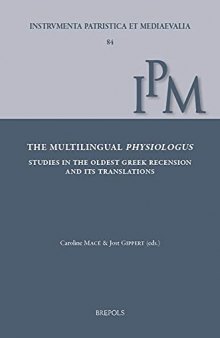 جزییات کتاب
جزییات کتاب
This book uncovers new material about the ancient Christian work known as the Physiologus and affords new insights into its multilingual transmission and reception. Ten chapters and accompanying new editions of sample texts treat the oldest Greek recension of the Physiologus and its early translations into Latin, Armenian, Syriac, Coptic, Ethiopic, Georgian, Arabic, and Old Slavonic. Produced by a team of specialists in these areas, the book will remain for years to come a Physiologus reference work and a model for dealing with ancient texts transmitted in multiple languages. The Physiologus is an ancient Christian collection of astonishing stories about animals, stones, and plants that serve as positive or negative models for Christians. Written originally in Greek, the Physiologus was translated in ancient times into Latin, Armenian, Syriac, Coptic, Ethiopic, Georgian, Arabic, and Old Slavonic. Throughout its transformations and adaptations, the Physiologus has never lost its attraction. The present volume offers an introduction to the significance of the Greek text, a new examination of its manuscript tradition, and a completely revised state of the art for each of the ancient translations. Two chapters of the Physiologus, on the pelican and on the panther, are edited in Greek and in each translation. These editions are accompanied by a new English rendering of the edited texts as well as short interpretative essays concerning the two animals. The volume affords new insights into this fascinating book's diffusion, transmission, and reception over the centuries, from its composition at the beginning of the third century CE in Alexandria to the end of the Middle Ages, and across all regions of the Byzantine Empire, the Latin West, Egypt and Ethiopia, the Middle East, the Caucasus, and Slavia orthodoxa.



 دانلود کتاب
دانلود کتاب

 جزییات کتاب
جزییات کتاب





 این کتاب رو مطالعه کردید؟ نظر شما چیست؟
این کتاب رو مطالعه کردید؟ نظر شما چیست؟
